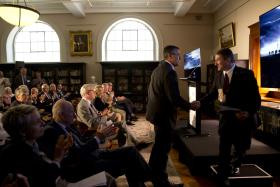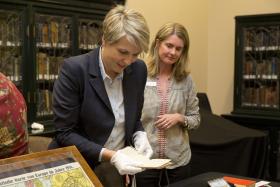News Corp Australia and the World War I diaries
Corporate partnerships success story
The collection and digitisation initiative
The State Library holds one of the best collections of diaries and letters written by Australian men and women who served in the First World War. This extraordinary collection also contains maps, photographs, artworks, posters and newspapers of the Great War.
News Corp were very interested in the stories of the diggers and the commemoration of Australia's involvement in World War One. This made them the perfect partner to join with the Library in this massive undertaking of digitising all the diaries and journals and scrapbooks.
The goal was to share the vivid stories and first hand accounts of the troops on the frontline with the entire community and make this valuable resource free for all of Australians.
As part of this initiative the Library constructed a purpose-built transcription tool to assist with the transcribing of the diaries and letters to unlock their compelling stories. 50,000 pages of digitised diaries were released online for the public to transcribe.
Through the foresight and generous support of News Corp Australia, the Library has been able to share digitally over 1,400 handwritten intimate accounts (by around 700 diarists) including soldiers of all ranks, doctors, nurses, stretcher-bearers, journalists and POWs. These capture the authentic and personal observations of those who served; from haunting personal details from the front lines to images captured by photographers, stories documented from the home front, internees and indigenous servicemen and women.
The beauty of having News Corp as a partner meant that they could share the stories through their newspapers and many other platforms.
At the launch News Corp Chief Executive Julian Clarke said : "We are proud to support the commemoration. As part of this support we we will bring to all Australians the often raw thoughts and moving experiences of Australians fighting at Gallipoli and on the Western Front as told through their diaries."
The significance of the collection

NSW state librarian and chief executive Alex Byrne said: “Thanks to the tremendous support of News Corp Australia, compelling stories of the First World War will be told through some of the 1,100 personal diaries held in the State Library of NSW’s unrivalled collections.
Added Byrne, "It’s not until you read these moving first-hand accounts –written by soldiers, doctors, nurses, stretcher bearers, journalists and artists, often in very difficult conditions - that you begin to understand Australia’s role in what was called the ‘war to end all wars’."
The stories are indeed compelling and heart wrenching. For instance, Hector Brewer, a Sydney horse groom when he enlisted aged 19 in 1914, wrote: “The pitiful part of these attacks is that many badly wounded men are unable to get back and receive proper comfort and attention. It makes one heartsick to hear the poor chaps moaning and crying for the help which cannot be given. This is the crowning horror of war I think.”
The website is a commemorative record keenly sought by the public and is of special interest to researchers, historians, teachers and students.

News Corp Australia’s CEO Clarke said: “The First World War not only took a terrible human toll it was also critical in forming our national character. Its importance continues to be deeply relevant today. Their accounts are vivid, thought-provoking and sad. They write about everyday life on the front, fear and bravery in battle, and the loved ones at home that they missed so terribly. We will honour their stories, and bring their experiences, to all Australians,"
This unique collection has been acknowledged on the UNESCO Australian Memory of the World Register in recognition of the cultural importance of the Library’s collection of WWI diaries. The Australian UNESCO Memory of the World Program is part of an international initiative, which aims to safeguard the documentary heritage of humanity and recognise the significance of all heritage materials.
The partnership didn't stop with the World War One Diaries. News Corp Australia will work with the State Library of NSW to publish such stories of Australian service men and women under the title “100 Years of Untold Stories: ANZAC to Afghanistan.”
There's been call-out for and collection of modern-day diggers’ diaries and other correspondence including digital correspondence such as tweets, emails and Facebook posts aims to ensure the nation continues to build a contemporary view of war.